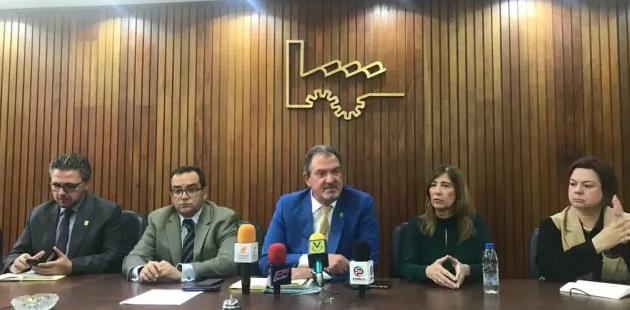
The President of Fedecámaras (National federation of chambers of commerce), Adán Celis, stated that they are betting on a productive, industrialized and inclusive economy, where local and foreign businessmen have security so that large-scale investments can resume and the country’s economy can improve.
By Correspondent lapatilla.1eye.us
During a visit to Valencia, regarding the 87th anniversary of the Carabobo Chamber of Industrialists, Celis pointed out that work must be done within a robust legal framework in which respect for private property is guaranteed and thus, generate trust in investors.
“At the same time, this legal framework should have a different structure, one that does not focus on regulations, but rather on promotion. Instead of having a State that regulates, we want a State that promotes,” said Celis.
The President of Fedecámaras said that another measure that would foster confidence in investors and respect for private property is that companies that were expropriated and plundered in the past return to their legitimate owners, while those that would still be in the hands of the State enter into a transparent bidding process.
“The important thing is to rescue the word trust. The fact that the Venezuelan State proceeds, just as it returned the ‘Sambil of La Candelaria’ (Shopping Center) and all this created was a good environment, it can do the same with many of these companies that were plundered and others that are in the hands of the State, and carry out a process of return of companies or privatization. This would give a very good image to the outside, an image of respect for private property. The image we give to the outside that things are being done differently from the past is very important,” he highlighted.
Celis pointed out that another aspect that must be worked on is the quality of public services. He mentioned that private companies can work together with the State so that the population can have better services.
He said that the Chevron model, which is being used in the oil industry, has generated benefits, so he considered that it could be replicated in the area of basic services.
“We are not talking about using the term privatization, but using a model like Chevron, a model where there is a conjunction between the State and the private sector to manage these companies. Our public services require investment, the State is not able to provide it, so we are going to look for it outside, but to look for it, a model must be presented where foreign investors feel comfortable with the necessary guarantees to be able to invest,” he stated.
On the other hand, Celis commented that in recent months they have been talking with spokespersons from the ruling party to find solutions to the different situations they face.
The income of Venezuelans
The president of Fedecámaras pointed out that in order to increase the income of Venezuelans, it is necessary to attract businessmen to invest in the country and create the conditions for Venezuelan entrepreneurs to formalize and create new companies.
“The only way to increase the income of Venezuelans is through investment, not through general increases in salaries and wages, which ends in inflation,” he said.
Celis reported that, by mandate of the International Labor Organization (ILO), they are participating in rounds with the Ministry of Labor to reach an agreement regarding the formula to calculate the minimum wage. However, he clarified that the only one that has the power to set the amount and decree a new salary is the State.
Laws
Celis considered that some legal instruments such as the Fair Costs and Prices Law represent an obstacle for the sector, as does the Large Financial Transactions Tax Law (Igtf), whose rate has generated an obstacle in transactional processes. “We could work to lower the amount of the tax for a much lower level,” he added.
Likewise, he pointed out that it would be interesting to have an Investment Protection Law, which, in his opinion, could attract new investments.
Industries fight to continue in Venezuela
The President of Fedecámaras Carabobo, Ana Isabel Taboada, stated that industries and businesses are doing their best to continue operating in the country. She expects that in the last half of the year the sector will register growth.
“The progress that has been made through the dialogues to request that the legal reserve be lowered, to be able have financing, so that the Tax Harmonization Law translates into benefits for entrepreneurs and businessmen. I believe that we are doing the best we can, the main phrase is to have confidence,” she said.
For his part, the president of the Chamber of Industrialists of Carabobo, Luis Rossi, assured that despite the difficulties, the industrialists remain firm. He specified that in the Chamber they have around 130 members.
“The food sector, some of the chemical and mechanical metal sectors are beginning to wake up a little more, others are still asleep, such as the automotive sector and its derivatives,” he said.

